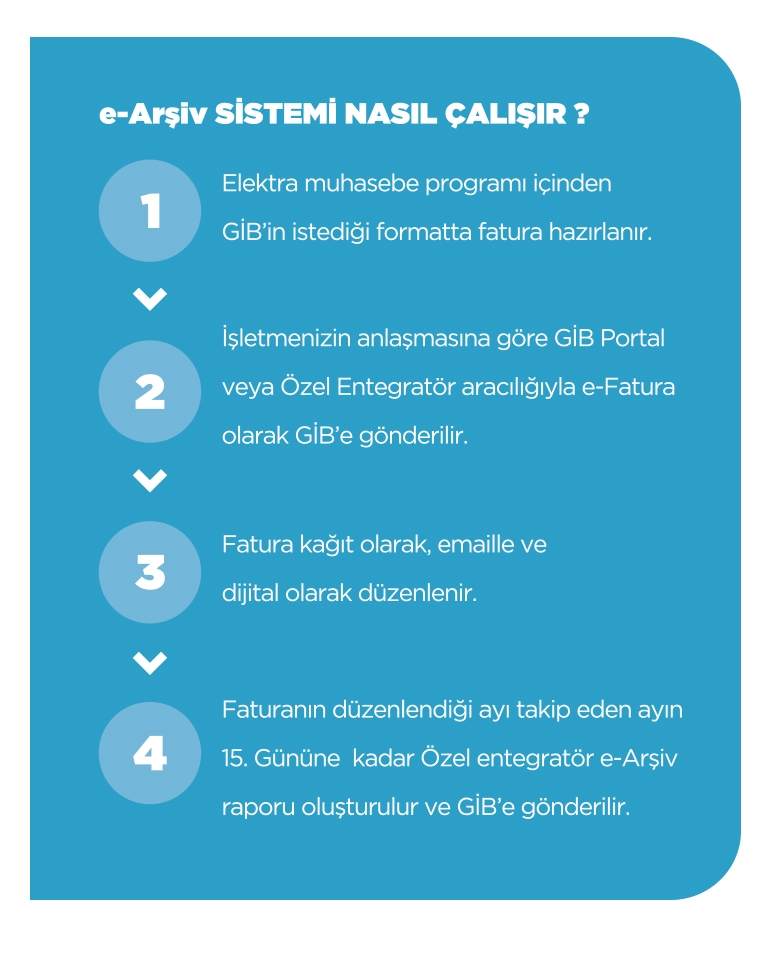- CORPORATE
- MODULES
- Mobile Applications for Guests
- Mobile Management System
- Online Rezervation
- PAY TV Integration
- Personnel Attendance Control System
- Pos System
- Sales and Marketing Monitoring
- Technical Service Management
- Timesharing Management
- Banquette Management
- Call Center & Sales CRM Integration
- Call Management System
- Channel Manager
- Crm + Kiosk System
- ETS Accounting Management System
- ETS Personnel and Payroll System
- ETS Procurement Method
- Front Office Management
- Health, Sports and SPA Management
- HR Performance Management
- ID and Passport Reading Software
- Integration of Guest Comment Websites
- Inventory and Cost Analysis Program
- Inventory and Depriciation Monitoring
- Invoice Management
- iSafe Internet Security and Logging
- Loyalty Management
- Call Center & Sales CRM Integration
- ElektraWEB
- REFERENCES
- SUPPORT
- Buy Service
e-INVOICE, e-ARCHIVE AND e-BOOK TRANSITION PACKAGES GIFTS CREDITS

E-invoice, which has been in practice since the enforcement of General Communiqué on the Tax Procedural Code (Serial No. 397 dated 5.03.2010), and contains data required by the TPL and whose data format and standards are determined by the Revenue Administration, is an electronic document where transmission between the buyer and the seller takes place on a central Revenue Administration platform. e-invoice is not a new document type, and carries the same legal characteristics as printed invoices. The e-invoice practice is aimed to create a single and standard format for vendors and purchasers to create a safe, time and cost reducing system managed by the Revenue Administration.


WHO IS WITHIN THE SCOPE OF e-INVOICE?
Keeping electronic books and using e-invoice has become obligatory with the General Communique on the Tax Procedural Code (Serial No. 454, dated 20.06.2015 and published in the Official Gazette No. 29392) to taxpayers listed below.
– Taxpayers whose gross sales from 2014 or subsequent fiscal periods is over 10 Milyon TL
– Taxpayers licensed by the Energy Market Regulatory Authority (EMRA) due to the production, importing, delivery etc. of goods stated in list I attached under the 6/6/2002 dated and 4760 numbered 4760 Special Consumption Tax Ordonnance. Those with dealership licences exclusively will not be subject to this article.
– Taxpayers producing, construction and importing good under List III of the Special Consumption Tax Ordonnance
 WHAT IS e-BOOK?
WHAT IS e-BOOK?
The entirety of information required to be kept in book according to the Tax Procedure Law and/or Turkish Commercial Law independent of form provisions.
WHO IS UNDER THE COPE OF e-BOOK
Companies using e-Book and e-Invoice are legally obliged to use but all voluntary companies can use e-Book. This way they will be exempt from having their books certified, printed and having to save them for 10 years.

HOW DOES THE e-ARCHIVE SYSTEM WORK?
The End of Saving Your Invoices Physically: Saving printed invoices and piles of invoices are a thing of the past. Also you will prevent physical wear and will have stored it in much more orderly fashion.
Increases Customer Satisfaction: When a customer wants to return an item, they have to get a printed version of the invoice and fill out the section relating to refunds and bring it where it was both.
WHAT IS THE DIFFERENCE BETWEEN e-ARHIVE AND e-INVOICE
|
e-Archive |
e-Invoice |
| Invoices can be sent both electronically and as a printout | Invoices can only be sent electronically, printouts cannot be sent |
| Compulsory for taxpayers which make sales online and have a net gross higher than 5 million TL during the 2014 fiscal year | Compulsory for taxpayers with stated in law 4760 and with more than 10 million in during the 2014 fiscal year |
| e-Archive invoices can be sent to clients who aren’t e-Invoice taxpayers. The person receiving the invoice does not have to be an e-Archive tax payer | The person receiving an e-Invoice must be an e-Invoice taxpayer |
| A 2nd copy of the e-Archive invoice must be saved electronically | All e-Invoice copies must be saved electronically |



























